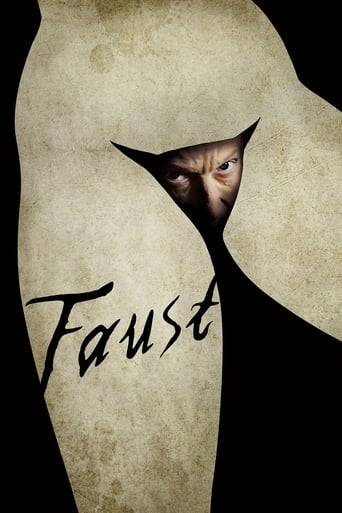Bryan Kluger
Back in 2011, Russian director Aleksandr Sokurov tackled the iconic story of 'Faust', something that has been interpreted and done many times over since Johann Wolfgang von Goethe first wrote the version most recognized days a few hundred years ago. It's quite a big feat to tackle this subject matter and make work on an artistic and entertaining level, but Sokruov make it work and eventually the film went on to win the top award at the Venice Film Festival of that year.If you're unfamiliar with the story of 'Faust', don't let this box art trick you. If you go solely from the box art, you might think this is a very boring period piece, but you would be wrong in that assumption. So wrong in fact, that the movie basically starts out with an image of a corpse's sexual organs. I know, how very 'Nekromantik' of them, right? The film centers on a man named Faust (Johannes Zeiler) who is very interested in what makes the world function, humans love, and if people really have souls.Faust tries to research this and learn for his own sake. He even goes so far as to literally dig and play with people's guts and blood in order to find a higher plane of existence and soul to humanity. And yes, there is enough gore for your horror hounds out there to enjoy. Fast befriends Moneylender (Anton Adasinsky), who is basically the Devil himself, as he takes Faust on a journey through town, showing him the bad things of the world. But Faust soon comes infatuated with a beautiful woman named Gretchen (Isolda Dychauk).Faust literally sells his soul to his new friend the Devil in order to have Gretchen, which sets off a series of events, which ultimately leaves Faust in Hell. Sokurov tends to tell this gruesome and twisted tale in an abstract way, more so than a literal way, and it takes a little time to understand what exactly is going on.His camera-work is excellent and is a new take and very fresh adaptation of this classic tale. The set design is haunting and award worthy as well. The actors deliver on their performances spot on with this type of story telling, which to say the least is not for weak-stomached. It would have been nice to have a more cohesive narrative here, rather than someone narrating for us the entire time and a movie that is made with an abstract eye, rather than a literal one, would have done wonders for the entertainment value here, but one thing is for sure, you won't be able to look away here. This version of 'Faust' is definitely worth seeing.
Armand
it is not the best Faust adaptation. the form is different, the Sokurov ambition to create his story is obvious, the images are pieces from same material of others movies by him. but it is far to be the worst adaptation. short, the lead character of film is the director. and this character is Mephisto in clothes of Faust. the dark scenes, the atmosphere, the dialogs, the Georgian young man or Isolda Dychauk as Renaissance Madonna/Margareta, the first scene and the last, each is letter of a letter who desire say more than its text. a profound film and not uninspired game with a delicate subject. good performance, interesting presence of Hanna Schygulla, smart manner to translate to present the Goethe drama. but , more than philosophic movie, it is a too complicated labyrinth. the ambition is to impress with entire force. but something missing. maybe, the soul.
Toon van Miert
The decors are beautiful, but the acting is horrible. I simply do not understand why the people interact with each other in this manner. They walk like there's no room to move. (You'll understand it when you see it.) Every time a conversation occurs (constantly)it is disrupted by background noise, with only one purpose, to annoy the viewer. Everybody who has read Goethe's Faust will be shocked. This adaptation does not even come close. I love movies, I truly do. Even when I don't like a movie I can still understand the appeal. But not with Faust. This was the first time I walked out of the cinema during a film.
Wim Nijssen
The way Sokurov treats this story makes it clear that his characters are all immersed in the day tot day doings, the earthly aspects of our lives, and it is hard or even impossible to escape. He brings it home to us, he gets us involved through his camera and sound, Faust becomes us. The first time I know of that this story was told in such a way that we can actually get inside Faust. Sokurov brings home some intriguing themes. Is Faust's soul maybe already missing from the start? What is our perception of Faust's hell and/or heaven, and how easy are we manipulated? We don't seem to need a lot of arguments and talking to win us over...




